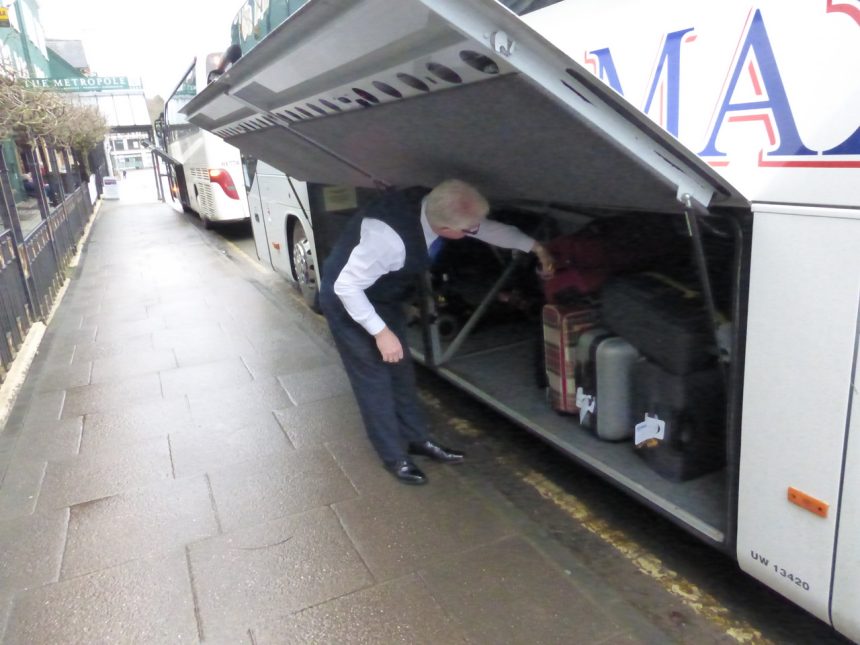Q
One of my coach drivers has raised concerns about loading and unloading luggage. Where do operators stand on instructing drivers to handle luggage?
A
Health and safety legislation requires all employers to provide a safe work environment for workers, which includes a duty to protect them from risk of injury caused by manual handling such as loading and unloading.
The need to handle passengers’ luggage is an integral part of a coach driver’s role — one that cannot, for most, be avoided altogether. Operators therefore need to assess, manage and control the risk of injury posed to drivers by luggage handling to make that risk as low as is reasonably practicable.
Operators should undertake a risk assessment which, first, identifies where the risk of injury lies — for example, the need for drivers to adopt awkward postures while accessing luggage compartments. Next, operators should identify appropriate control measures to reduce that risk.
These might include provision of tools and equipment (for example, luggage hooks) to facilitate sliding of luggage, covering sharp edges or protrusions, ensuring adequate lighting within luggage compartments and implementing a system to restrict the weight of items.
Operators should include in their booking terms reference to the guidelines for luggage weights being a maximum of 20kg per item and make it clear drivers are not obliged to handle luggage that could cause injury — passengers may have to load items weighing more than 20kg themselves. This should be formalised as a safe system of work governing luggage handling within the operator’s business.
Drivers (and other relevant staff) should be instructed and trained on the policy (retain accurate records of who has received training and forward-plan refresher training). Suitable manual handling training should also be provided; this might be generic Driver CPC or more bespoke training tailored to the business.
Operators must then ensure policies and procedures are complied with (taking appropriate action where noncompliance is identified) and revisited: (i) periodically; (ii) if there is an incident/injury arising from luggage handling; and/or (iii) when something changes in relation to the task (for example, introduction of a new vehicle type) to ensure they remain effective in managing injury risk.
[Answer by Laura Hadzik, Partner/Co-Head of Commercial Road Transport at JMW Solicitors]
Q
I am cautious about granting flexible working arrangements, because other employees may believe they will be subject to more than their fair share of unsociable shifts.
What are employers’ obligations when it comes to flexible working?
A
Employees have the right to request flexible working, but this does not mean they have an automatic right to a flexible working arrangement. Operators are required to handle all requests in a reasonable manner but can refuse a request if they have a valid business reason to reject it.
The Employment Rights Act 1996 (ERA 1996) lists the valid business reasons for refusing such requests, including: a detrimental effect on ability to meet customer demand; an inability to reorganise work among existing staff; and a detrimental impact on quality and/or performance.
If, after consideration of a flexible working request, an operator believes there is no viable way to adjust/redistribute the remainder of the work between other employees, or the impact of accepting the request would burden other employees to the extent it would cause a detrimental impact on quality of work or performance, they will have statutory grounds to reject the request.
It is not, however, a valid business reason to reject a flexible working request because employees perceive they will receive an unfair share of unsociable shifts — especially if that is not the case.
Only the statutory reasons in ERA 1996 can be used as grounds for rejecting flexible working requests.
If there is a valid business reason why an operator cannot accept a flexible working request, they should consult the relevant employee and ensure they understand the issues surrounding the request before making an official decision — it might be a compromise can be reached.
[Answer by Nosheen Akhtar, Trainee Solicitor]
- For a free legal consultation with JMW Solicitors, contact Laura Hadzik on laura.hadzik@jmw.co.uk/0345 450 7726
- Email your legal questions for future issues to routeone on editorial@route-one.net



























